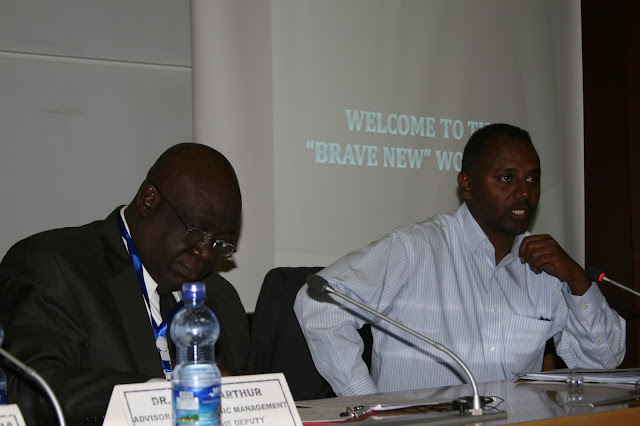MEETING H.E Tumusiime Rhoda Peace, AU Commissioner for Rural Economy and Agriculture and rural economy
African leaders have continued to rally our continent around the four pillars of peace and security, regional integration and development, institutional capacity building and shared values. This is because of the reaslisation that there can be no development without peace and, likewise, no peace without development, and, indeed, none of the two will be achieved without good governance, observance of rule of law and human rights.
Ayoub mzee with commissioner Tumusiime
20th AU SUMMIT
Strategic partnerships: “Africa chooses its partners and all should know it” says AUC Chief of Staff
In
his introductory remarks, Ambassador Natama stressed on the fact that
relations and partnerships between Africa and the rest of the world
should be based on a mutual understanding, allowing Africa to respond to
its needs and benefit from those partnerships. He cited Afro-Arab,
TICAD, Africa-South America, Africa-EU, Africa-China, Africa-Turkey and
Africa-India as partnerships based on mutual will and which should
evolve in a beneficial manner. He further clarified that Africa should
be aware of its interests and the benefits the continent should be
foreseeing with the partnerships concluded. However they are sometimes
perceived as unbalanced due to the historical background. In his
capacity as the coordinator of partnerships, he informed that the role
of the African Union is to make sure Africa’s interests are taken into
account.
He
explained that 30% of natural resources and one third of energy sources
are located in Africa. Rather than exporting raw materials and
importing manufactured products, the continent should put in place
processing infrastructure. Combined with better governance, a stable and
secure environment, Africa should get rid of the impoverishment
generated by the sole exportation of its raw materials. Though
entrepreneurship implies taking risks, compliance with the rule of law
reduces risks and attracts investors, Ambassador Natama further
indicated. “Development should be from within and initiated first by
Africa and for Africans”.
The
main challenge is now to process those resources for the benefit of the
people of Africa and share it equally to avoid frustrations. Governance
is a major challenge and Africa should adopt mechanisms leading to an
environment conducive to growth. In addition, stability and security are
also core elements to create growth. Africa exports its raw resources
and imports manufactured products. This cycle impoverishes Africa. “We
need to transform our resources, adopt good economic governance, share
equally among the population,” the Chief of Staff said.
21st Session of the GIMAC - Gender is my Agenda Campaign
GIMAC hosts special guests such as Hon. Mary Robinson, Former President of Ireland and President of the Mary Robinson Foundation-Climate Justice (MRFCJ), Dr. Nkosazana Dlamini-Zuma, Chairperson of the African Union Commission and Ms. Zainab Bangura, the UN Special Representative of the Secretary-General on Sexual Violence in Conflict.
About a hundred African women leaders are attending the 21st session of GIMAC to address the theme "The Role of Women in Pan-Africanism and the African Renaissance."
Other important topics shall focus on women, peace and security and the role of women in agriculture.
The conference will hear the experiences of women from countries in conflict like Mali, Democratic Republic of Congo (DRC) and Central African Republic.
The GIMAC is a platform coordinated by the NGO, Femmes Africa Solidarité (FAS), and consisting of more than 55 women's organizations from civil society across the continent.
Since 2005, the GIMAC meets twice a year on the sidelines of the Summit of Heads of States and Governments of the African Union to defend the rights of women and monitor the implementation by States of the Solemn Declaration on Gender Equality in Africa (SDGEA).
A press conference will be held January 23, 2013 at 16:00 in the Press Room of the African Union with Dr. Nkosazana Dlamini-Zuma, Chairperson of the African Union Commission, Hon. Mary Robinson, Former President of Ireland and Mrs. Bineta Diop, President of Femmes Africa Solidarité.
Hisséne Habré Trial Should Start in 2013 » says AU Legal Counsel
Addis Ababa, 22 January 2013
– Ms Djenaba Diarra, Acting Legal Counsel of the African Union
Commission(AU) has, today, updated the media on two issues featuring
high on the agenda of the AU 20th Summit : the Hisséne Habré Case and
the status of ratification of AU instrument.
With regard to Hisséne Habré’s trial, she stated that «the AU strongly believes that the trial should start sometime in 2013».
Ms. Diarra reported on progress made in collaboration with the Republic
of Senegal, which was mandated in 2006 by the AU Assembly to judge
Habré on behalf of Africa. Since his ascension to power, President Macky
Sall has taken concrete steps toward the trial, said Ms. Diarra. The
technicalities, e.g. the extraordinary chambers located within the
national court of Senegal are being worked out. «The trial is
important for the AU. It shows our willingness to fight impunity and
shows that we have adequate African mechanism to address African issues »
Ms. Diarra added. With regard to funding, Ms. Diarra recalled that the
pledges made in 2010 by Africa and the international community, were
confirmed in 2011.










